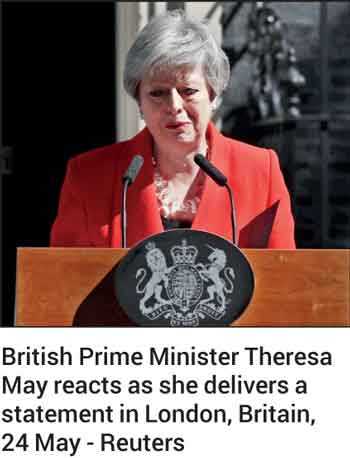Friday Feb 13, 2026
Friday Feb 13, 2026
Saturday, 25 May 2019 00:09 - - {{hitsCtrl.values.hits}}
 LONDON (Reuters): Fighting back tears, British Prime Minister Theresa May said on Friday she would quit, triggering a contest that will bring a new leader to power who is likely to push for a more decisive Brexit divorce deal.
LONDON (Reuters): Fighting back tears, British Prime Minister Theresa May said on Friday she would quit, triggering a contest that will bring a new leader to power who is likely to push for a more decisive Brexit divorce deal.
May’s departure will deepen the Brexit crisis as a new leader is likely to want a more decisive split, raising the chances of a confrontation with the European Union and a potentially unpredictable snap Parliamentary election.
May set out a timetable for her departure – she will resign as Conservative Party leader on 7 June with a leadership contest beginning the following week.
Her voice cracking with emotion, May, who endured crises and humiliation in her failed effort to find a compromise Brexit deal that Parliament could ratify, said she bore no ill will.
“I will shortly leave the job that has been the honour of my life to hold,” May said. “The second female Prime Minister, but certainly not the last.”
“I do so with no ill will but with enormous and enduring gratitude to have had the opportunity to serve the country I love,” May said, with her husband, Philip, looking on.
May, once a reluctant supporter of EU membership, who won the top job in the turmoil that followed the 2016 Brexit vote, steps down with her central pledges – to lead the United Kingdom out of the bloc and heal its divisions – unfulfilled.
“It is, and will always remain, a matter of deep regret to me that I have not been able to deliver Brexit,” May said, adding that her successor would have to find a consensus to honour the 2016 referendum result.
PM Boris Johnson?
May bequeaths a deeply divided country and a political elite that is deadlocked over how, when or whether to leave the EU.
The leading contenders to succeed May all want a tougher divorce deal, although the EU has said it will not renegotiate the Withdrawal Treaty it sealed in November.
Sterling reversed initial gains it made on May’s resignation.
Boris Johnson, the face of the official Brexit campaign in 2016, is the favourite to succeed May. Betting markets put a 40% implied probability on Johnson winning the top job.
Others tipped by betting markets are Dominic Raab, a Brexit supporter and former Brexit secretary, with a 14% implied probability on his chances.
Environment Secretary Michael Gove, former House of Commons leader Andrea Leadsom and Foreign Secretary Jeremy Hunt each have a 7% probability, according to betting markets.
Defence Secretary Penny Mordaunt and International Development Secretary Rory Stewart each have a 4% chance of the top job while Home Secretary (Interior Minister) Sajid Javid has a 3% chance.